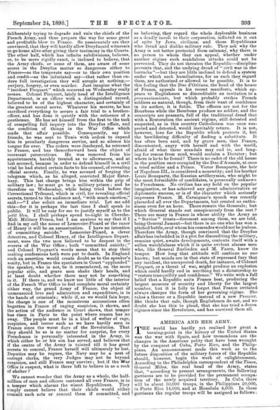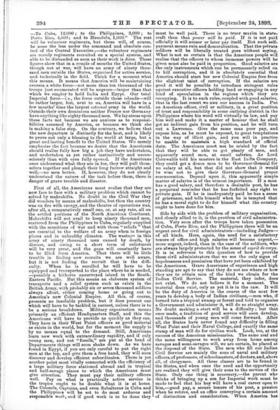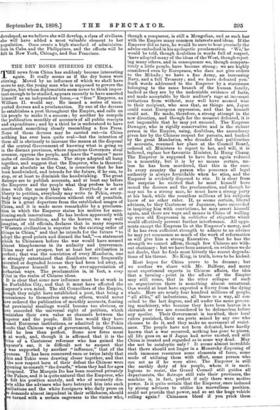AMERICA AND HER ARMY. —To Cuba, 12,000; to the Philippines,
3,000; to Porto Rico, 4,000; and to Honolulu, 1,000." The rest will be volunteer regiments, but these will, of course, be none the less under the command and absolute con- trol of the Central Executive ;—the volunteer regiments are merely regiments recruited on a special system, and able to be disbanded as soon as their work is done. These figures show that in a couple of months the United States, though not at war, will have an army of ninety thou- sand men outside the States, organised for active service, and technically in the field. Think for a moment what this means. It means that America will be maintaining oversea a white force—not more than ten thousand of the troops just enumerated will be negroes—larger than that which we employ to hold India and Egypt. Our total Imperial force—i.e., the force outside these islands—will be rather larger, but, next to us, America will have in a few months' time the largest external army in the world. Outside their own dominions neither France nor Germany have anything like eighty thousand men. We lay stress upon these facts not because we are anxious as to responsi- bilities assumed by America, or because we think she is making a false step. On the contrary, we believe that the new departure is distinctly for the best, and is likely to prove not only a blessing to the world at large, but a great and lasting benefit to the -United States. We merely emphasise the fact because we desire that the Americana should realise fully how big a job they have undertaken, and undertaken as yet rather instinctively and uncon- sciously than with eyes fully opened. If the Americans once understand what they are in for, they will pull them- selves together and plough their long furrow straight and well,—no men better. If, however' they do not clearly understand the nature of the task before them, there is danger of grave trouble and disaster.
First of all, the Americans must realise that they are now face to face with a military problem which cannot be solved by makeshifts. No doubt in the Civil War they +lid wonders by means of makeshifts, but then the country was on fire with energy, and the theatre of operations was, after all, a comparatively small one, or, at any rate, all on the settled portions of the North American Continent. Makeshifts will not avail to keep ninety thousand men, scattered from the Philippines to Cuba, regularly supplied with the munitions of war and with those "reliefs" that are essential to the welfare of an army when in foreign places and in unhealthy climates. The wastage in this army of ninety thousand men caused by death, by disease, and owing to a short term of enlistment will be very great, and the gaps will constantly have to be filled from America. That there will be little trouble in finding new recruits we are well aware, but it is not finding the recruit that is the diffi- culty. When he is enrolled he will have to be equipped and transported to the place where he is needed, —possibly a hitherto unsurveyed island in the South- Eastern Pacific. But*this means an elaborate system of transports and a relief system such as exists in the British Army, with probably six or seven thousand soldiers always afloat, either coming home or going out to America's new Colonial Empire. All this, of course, presents no insoluble problem, but it does present one which will have to be tackled in earnest, unless there is to be a serious breakdown. Military organisation means primarily an efficient Headquarters Staff, and this the Americans will have to provide as quickly as they can. ' They have in their West Point officers as good material - as exists in the world, but for the moment the supply is by no means equal to the demand. Still, Americans learn new work with extraordinary rapidity, and if only young men, and not "fossils," are put at the head of Departments things will soon shake down. As we have found in Egypt, if you are only careful to put the right men at the top, and give them a free hand, they will soon discover and develop efficient subordinates. There is yet another point most vitally connected with the efficiency of a large military force stationed abroad and in tropical and half-savage places to which the Americans must give attention. They must pay their military officers well. Pay on what is practically active service in the tropics ought to be double what it is at home. The Colonels, Captains and even Subalterns in Cuba and the Philippines will be set to do most arduous and responsible work, and if good work is to be done they must be well paid. There is no truer maxim in state. craft than that power will be paid. If it is not paid officially it will sooner or later pay itself. But such self. payment means ruin and demoralisation. That the private soldiers will be liberally treated goes without saying. What is not so certain is that the American people will realise that the officers to whom immense powers will be given must also be paid in proportion. Good salaries are the only instruments which can be permanently relied on to kill corruption, and it is absolutely essential that America should start her new Colonial Empire free from the slightest taint of corruption. If the salaries are good it will be possible to introduce stringent rules against executive officers holding land or engaging in any kind of speculation in the regions which they are occupying. It is to such rules, coupled with good salaries, that in the last resort we owe our success in India. Put an American officer, civil or military, in a great position of trust and responsibility in some outlying district in the Philippines where his word will virtually be law, and pay him well and, make it a matter of honour that he shall get no indirect gain from his position, and he will turn out a Lawrence. Give the same man poor pay, and expose him, as he must be exposed, to great temptations in the way of illicit gain, and you will in practice be unable to maintain a high standard of official duty. The Americans must not be misled by the fact that they will be able to get plenty of men, and apparently sound men, at small salaries. As Lord Cornwallis told his masters in the East India Company, they could get a dozen men to be Governor-General for no salary at all, but that did not show that it would be wise not to give their Governor-General proper remuneration. Depend upon it, this apparently simple matter of salaries is of the utmost importance. If a man has a good salary, and therefore a desirable post, he has a perpetual reminder that he has forfeited any right to private gain. If he is inadequately paid he has a sense of grievance, and tells himself when he is tempted that he has a moral right to do for himself what the country ought to have done for him.
Side by side with the problem of military organisation, and closely allied to it, is the problem of civil administra- tion. Very soon after the troops have taken possession of Cuba, Porto Rico, and the Philippines there will be an. urgent need for civil administrators—including Judges— of all kinds. Here, again, the need for a satisfactory tenure of office and high salaries will become urgent,— more urgent, indeed, than in the case of the soldiers, who are always largely protected by the sense of esprit de corps. It is in reference to this question of how to provide these civil administrators that we see the only signs of hopelessness and pessimism that have yet been exhibited by the Americans. Grave Americans of experience and high standing are apt to say that they do not see where or how they are to obtain men of the kind we obtain for the Indian Civil Service. The material, they infer, does not exist. We do not believe it for a moment. The material does exist, only as yet it is in the raw. It will be the duty of America in the course of the next few years to develop a body of Indian civilians,—men who, if turned into a tropical swamp or forest and told to organise a Government and administer it, will do so straight away. No doubt making a start will be a difficulty ; but that once made, a tradition of good service will soon develop, and thousands of young men will come forward. After all, the States have never found any difficulty in filling West Point and their Naval College, and exactly the same stamp of man will do for civilian work. Look, too, at the success of the American missionaries. The same zeal and the same willingness to work away from home among savages and semi-savages will, we are certain, be placed at the disposal of the State. The men who fill our Indian Civil Service are mainly the sons of naval and military officers, of professors, of schoolmasters, of doctors, and, above all, of clergymen. All these classes are to be found in the States, and when once the need and the opportunity are realised they will give their sons to the service of the State. Only one thing is necessary,—the parent who thinks of bringing up a son for Imperial work must be made to feel that his boy will have a real career open to him,—good pay, a. secure tenure of his post, a pension when he retires, and an office conveying a certain amount of distinction and consideration. When America has developed, as we believe she will develop, a class of civilians, she will have added a most valuable element to her population. Once create a high standard of administra- tion in Cuba and the Philippines, and the effects will be felt in New York, Chicago, and San Francisco.








































 Previous page
Previous page